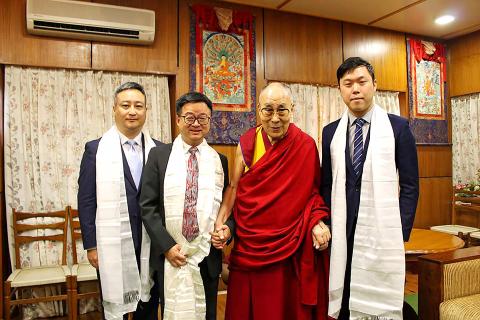Top Democratic Progressive Party (DPP) officials during a visit with the Dalai Lama in Dharamsala, India, vowed to forge closer cooperation with the exiled Tibetan government and to form an international “Silk Road of Democracy” (民主絲路) to fight Chinese oppression.
A direct channel has been established with the Dalai Lama after their fruitful talks from Wednesday to Friday last week, which focused on the strength of Taiwan’s democracy and protests in Hong Kong, DPP Secretary-General Luo Wen-jia (羅文嘉) said yesterday.
Luo was accompanied by party spokesman Lii Wen (李問) and public relations director Hsieh Yu-li (謝雨利) for their meeting with the Dalai Lama and officials from the exiled Tibetan government.

Photo from Lii Wen’s Facebook via CNA
“Taiwan’s main strength lies in its democracy,” Luo quoted the Tibetan spiritual leader as saying.
Although it is threatened by Chinese missiles and other intimidation tactics, “Taiwan’s strongest countermeasures include democracy, freedom and the comprehensive preservation of traditional culture,” Luo added.
Taiwan would build a broad international alliance that brings together Tibetans, Uighurs, Hong Kongers, Inner Mongolians and overseas Chinese democracy advocates to promote freedom, human rights and democratic values in China, Lii said.
The project would be called the “Silk Road of Democracy” to counter China’s Belt and Road Initiative, Lii said.
“The DPP and Tibetans share much of the same values and stand together under the same threatening force. Therefore, we shall forge a network with Tibetans, Uighurs, Hong Kongers and Inner Mongolians to pursue and consolidate democracy,” Luo said.
Asked whether there are plans to invite the Dalai Lama to Taiwan, Luo said that while he was representing the DPP and not the government on the trip, Taiwan is a free nation and the door is always open for people who seek freedom and democracy.
He said that the DPP welcomes the exiled Tibetan leader, who has not visited Taiwan since 2009.
“It is up to the willingness of His Holiness the Dalai Lama,” Luo added. “He has fond memories of his previous trips, but he said that his advanced age is not suitable for taking long flights.”
The DPP entourage also met with other key officials, including exiled Tibetan Prime Minister Lobsang Sangay, Legislative Speaker Pema Jungney, Secretary for Foreign Affairs Sonam Norbu Dagpo and Tibetan Youth Congress president Gonpo Dhondup.
Luo quoted the Dalai Lama as saying that he had not ruled out Taiwan as a location for his reincarnation, since it would take place in a Buddhist country.
Human Rights Network for Tibet and Taiwan president Tashi Tsering conferred hada, traditional Tibetan silk scarfs, on Luo, Lii and DPP Deputy Secretary-General Lin Fei-fan (林飛帆) to thank them for the party’s efforts in helping him obtain Republic of China citizenship.
As an exile, he has never seen his Tibetan homeland and has lived in Taiwan for 21 years, Tashi said.

AGING: As of last month, people aged 65 or older accounted for 20.06 percent of the total population and the number of couples who got married fell by 18,685 from 2024 Taiwan has surpassed South Korea as the country least willing to have children, with an annual crude birthrate of 4.62 per 1,000 people, Ministry of the Interior data showed yesterday. The nation was previously ranked the second-lowest country in terms of total fertility rate, or the average number of children a woman has in her lifetime. However, South Korea’s fertility rate began to recover from 2023, with total fertility rate rising from 0.72 and estimated to reach 0.82 to 0.85 by last year, and the crude birthrate projected at 6.7 per 1,000 people. Japan’s crude birthrate was projected to fall below six,

US President Donald Trump in an interview with the New York Times published on Thursday said that “it’s up to” Chinese President Xi Jinping (習近平) what China does on Taiwan, but that he would be “very unhappy” with a change in the “status quo.” “He [Xi] considers it to be a part of China, and that’s up to him what he’s going to be doing, but I’ve expressed to him that I would be very unhappy if he did that, and I don’t think he’ll do that. I hope he doesn’t do that,” Trump said. Trump made the comments in the context

SELF-DEFENSE: Tokyo has accelerated its spending goal and its defense minister said the nation needs to discuss whether it should develop nuclear-powered submarines China is ramping up objections to what it sees as Japan’s desire to acquire nuclear weapons, despite Tokyo’s longstanding renunciation of such arms, deepening another fissure in the two neighbors’ increasingly tense ties. In what appears to be a concerted effort, China’s foreign and defense ministries issued statements on Thursday condemning alleged remilitarism efforts by Tokyo. The remarks came as two of the country’s top think tanks jointly issued a 29-page report framing actions by “right-wing forces” in Japan as posing a “serious threat” to world peace. While that report did not define “right-wing forces,” the Chinese Ministry of Foreign Affairs was

PREPAREDNESS: Given the difficulty of importing ammunition during wartime, the Ministry of National Defense said it would prioritize ‘coproduction’ partnerships A newly formed unit of the Marine Corps tasked with land-based security operations has recently replaced its aging, domestically produced rifles with more advanced, US-made M4A1 rifles, a source said yesterday. The unnamed source familiar with the matter said the First Security Battalion of the Marine Corps’ Air Defense and Base Guard Group has replaced its older T65K2 rifles, which have been in service since the late 1980s, with the newly received M4A1s. The source did not say exactly when the upgrade took place or how many M4A1s were issued to the battalion. The confirmation came after Chinese-language media reported